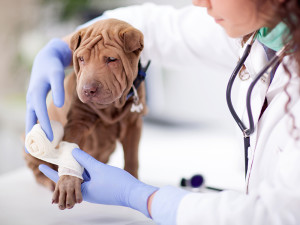How to Get Help With Vet Bills for Dogs Who Need Surgery
Worried about the cost of making your pet feel better? Help is on the way.

Share Article
In This Article:
Talk to Your Vet About Payment Options Organizations and Charities That Can Help Will Getting Pet Insurance Help? Where to Find Free Pet Food and Supplies
A sick or injured pet is every pet parent’s worst nightmare. On top of worrying about your sweet pup, you may be saddled with expensive bills for their care and questions about how to pay for all of it. The good news is that you can get help.
There are many options to consider, such as creative payment plans and lines of credit, as well as organizations providing financial support so your pets can stay with their loving families. Be sure to research all your options to choose the one that works best for you and your pet.
Main takeaways
There are many creative ways to pay for your pet’s medical care.
Be sure to speak with your vet about the options they are most familiar with.
Consider all your options including payment plans, lines of credit, and grants from nonprofit organizations.
Talk to your vet about payment options
If you are planning for a surgery, hospitalization, or another big procedure for your pup, your vet should provide an estimate for all of the expenses involved. Be sure to review the estimate with someone on staff, and discuss all of the payment options they offer. Sometimes, you can leave a small deposit upfront and pay the rest of the bill later, buying you time to gather the funds.

Your vet may also be tuned in to the best low-cost clinics in your area and have a personal connection to the staff there. Meanwhile, clinics may have their own payment plan options or funds they use to help people in need offset the cost of expensive procedures. Be honest about your struggle, so you can get the best options.
Organizations and charities that can help you with your vet bill
There are several different options available if you need financial help for your pet’s care. Always be sure to speak with your vet about local options, since they may be aware of specific organizations in your area. Here are some resources to consider.
CareCredit
CareCredit opens in new tab is a healthcare credit card that can be used for any veterinary expenses. Unlike many other resources on this list, CareCredit can be used for routine pet care including diagnostics, check-ups, preventative care, dentistry, spays/neuters, as well as emergency care. CareCredit will allow you to pay off big vet bills on a payment plan. If minimum payments are made on time within your payment plan window, you may be eligible for flexible financing options. You can apply for a card on their website — approval is based on your credit score. Keep in mind that this is a payment plan that needs to be paid back in full, so make sure you budget for those monthly payments.
The Pet Fund
The Pet Fundopens in new tab provides help for non-urgent, non-basic care for dogs and cats. This includes various types of cancer, eye diseases (like cataracts), chronic illnesses, and heart disease. Their website includes an in-depth description of what they can fund and how their application process works. Their grants exclude diagnostic tests, spay and neuter procedures, and life-threatening injuries that need immediate treatment. If you believe your pet fits the criteria, you can apply for a one-time grant.
Frankie’s Friends National Fund
Frankie’s Friendsopens in new tab awards grants for dogs in need of emergency, lifesaving, or specialized veterinary care for families who are in financial need. To qualify, a veterinarian must confirm that your dog has a good prognosis with treatment, and you must show that you meet their requirements for financial assistance.
Waggle
Waggleopens in new tab is a crowdfunding website specifically for pet care. You create an account, start a campaign, and raise funds for your pet’s care. Waggle is a nonprofit: They work directly with your veterinarian to certify a treatment estimate, and they send the funds directly to the vet clinic. If funds are raised exceeding the cost of care, Waggle turns those into grants for other pets in need.
SpayUSA
North Shore Animal League America’s SpayUSA is a referral network for free and low-cost spay and neuter services. You can use their search functionopens in new tab to input your zip code and find clinics near you that offer financial assistance for spay and neuter surgeries.
The Mosby Foundation
The Mosby Foundationopens in new tab gives you financial support for dogs who are critically ill, injured, neglected, and/or abused. They don’t help with routine medical care or diagnostic tests. All dogs must be spayed or neutered to qualify.
Brown Dog Foundation
Brown Dog Foundationopens in new tab works with pet parents and their vets to find the most affordable path of treatment, while helping bridge the gap in funds with a grant. Even if the organization cannot provide someone with a grant, they offer to help pet parents find other low-cost options in their area in addition to creative payment options.
Red Rover Relief
Red Roveropens in new tab assists pet parents when their dogs and cats require urgent, specific treatment. Their typical grant is around $250 and is intended to bridge the gap in funds needed to pursue treatment. Households must make an income of less than $60,000 per year to qualify, in addition to meeting other eligibility requirements.
Friends & Vets Helping Pets
Friends & Vets Helping Petsopens in new tab was founded to help pet parents cover the cost of treating curable illnesses or injuries, and to prevent the unnecessary re-homing or euthanasia of these animals. They work with your family and veterinarian to fund the cost of medical treatment such as broken bones, ambulatory care, expensive medication, or post-surgical prosthetics. Applicants must demonstrate financial need.
Paws 4 a Cure
Paws 4 a Cure opens in new tab uses a combination of crowdsourcing and grants to help families cover the cost of non-routine veterinary care including medications like insulin, treatment for diseases like heartworm, and other medical procedures. The maximum grant they provide is $200, and they help pet parents set up a crowdfunding website to raise additional funds. They also require proof of financial hardship.
Bow Wow Buddies Foundation
The Bow Wow Buddies Foundationopens in new tab provides grants for urgent medical care for serious conditions. Their maximum grant amount is $2,500 while the average grant is around $1,200. They are one of the few organizations that will provide grants for expenses that have already been incurred. You can apply for a grant up to 30 days after a procedure or hospitalization.
Help a Pet
Help a Petopens in new tab also provides grants to help people in need cover their pet’s veterinary expenses. This organization prioritizes helping senior citizens, differently abled individuals, and children from families that cannot afford pet care. Family income must be at or below $40,000 per year.
Joshua Lewis Animal Cancer Foundation
The JLACF opens in new tab is an organization dedicated to helping pet parents pay for the cost of cancer treatment. This organization is now under the umbrella of another organization, Frankie’s Friends, which oversees the application and funding of these grants.
Magic Bullet Fund
The Magic Bullet Fundopens in new tab, which is no longer offering grants, was dedicated to providing funds to help pet parents pay for their pets’ cancer treatments. However, their website still has a lot of useful information and resources for pet parents who may be going through this difficult process.
GoFundMe
GoFundMeopens in new tab is a crowdsourcing platform where individuals can create a website to raise money for their cause. This site can be used to raise money for anything, including pet care. As the creator of the fundraiser, it is your responsibility to spread the word about your fundraiser and to try to reach as many people as possible to solicit donations.
Lending USA Pet Loans
Lending USA Pet Loansopens in new tab provides loans to cover the cost of veterinary care. Keep in mind that this will result in a monthly repayment schedule, so be sure to budget for this. They are currently offering an option with no interest if you pay off the whole loan within the first six months.
US Department of Veterans Affairs
The Service Dog Veterinary Health Insurance Benefit opens in new tab is a form of pet insurance for veterans issued a service dog to support their hearing, vision, mobility, and/or mental health issues. The policy covers all treatments and medications that are medically necessary for the dog, as well as travel expenses incurred to obtain the service dog.
Local low-cost clinics
Check out resources in your area for low-cost veterinary clinics. Many organizations including the ASPCAopens in new tab and Humane Societyopens in new tab run low-cost clinics across the country where you may be able to get pet care at a much lower price than through a private clinic. Additionally, these clinics and some animal shelters may be able to provide financial assistance or grants to cover the cost of urgent care in the hopes of keeping pets with their families.
Will getting pet insurance help?
Pet insurance is one of the best proactive measures you can take to be prepared for unexpected medical expenses. Do your research, and learn about the kinds of insurance that are most effective and appropriate for your needs.
The bad news is that if you don’t have pet insurance when an emergency arises, you can’t apply for it after the fact. This is because most pet insurance companies do not cover pre-existing conditions. The best way to utilize pet insurance is to sign up as soon as you adopt a pet. Some pet parents also create an emergency fund for their pets, setting aside money that they can use in case the unexpected happens.
Where can you find free pet food and other supplies?
Depending on where you live, there are many places to search for free pet food and supplies. Food pantries often supply pet food in addition to human food. Some animal shelters will also give out pet food and other supplies to help keep pets with their families. You can also check out local “buy nothing” groups and online marketplaces where people may advertise supplies and pet food they are giving away or selling at a reduced rate.
Bottom line
Always research all the options available.
Whenever possible, plan ahead for emergencies by setting aside an emergency fund and signing up for pet insurance.
Your vet can be a great resource for information on the best local organizations and low-cost clinics in your area.
References
Brockman, Beverly K., et al. “The Price of Unconditional Love: Consumer Decision Making for High-Dollar Veterinary Care.” Journal of Business Research, vol. 61, no. 5, May 2008, pp. 397–405, https://doi.org/10.1016/j.jbusres.2006.09.033opens in new tab. Accessed 27 Apr. 2020.
Park, Rachel M., et al. “Association between Dog Owner Demographics and Decision to Seek Veterinary Care.” Veterinary Sciences, vol. 8, no. 1, 5 Jan. 2021, p. 7, https://doi.org/10.3390/vetsci8010007opens in new tab.
Summary of Pet Owner Surrender Analysis. 2018. network.bestfriends.org/sites/default/files/inline-files/212119_Network%20Research-Surrender%20analysis_CL.pdfopens in new tab.

Dr. Amy Fox, DVM
Amy Fox, DVM is a small animal veterinarian in New York City with over thirteen years of experience in a mixture of general practice, emergency medicine, and shelter medicine. A lifelong animal lover, Dr. Fox studied biology in college and then worked as a veterinary nurse before pursuing veterinary school at Cornell University. Her expertise includes surgery, dentistry, and management of chronic conditions, and she is interested in toxicology, pain management, nutrition, care of senior pets, and educational outreach. Dr. Fox also enjoys writing about veterinary medicine and teaching, and her work has previously appeared in Spruce Pets. In her free time, she loves to cook, garden, go for long runs, and hang out with her goofy mixed-breed dog May, who provides never ending comic relief!

Sio Hornbuckle
Sio Hornbuckle is the Assistant Editor at Kinship, where they frequently write for the site. As a writer, they specialize in pet news, animal science, and pop culture. They live in New York City with their cat, Toni Collette.
Related articles
![cat and dog laying on bed together]()
What’s the Deal With Pet Insurance?
It covers your pet so you can get that broken leg fixed—while keeping your wallet happy.
![A woman with tattoos hugging her white cat in a cluttered, art-filled room]()
Cats, Priceless. Cat Parenthood, Not So Much
A rundown of the most common cat expenses.
![shiba inu snuggling on couch with woman]()
Money Talks: The Dollars of Dog Parenthood
We crunched some numbers and yup, they’re worth every penny.
![French bulldog being examined at the vet via stethoscope]()
13 Tips for Saving Money at the Vet
Ways to lower your bill—without compromising your pet’s health.
![A woman in a yellow sweater and jeans sitting and petting the head of her gray cat eating dry food from the floor in her kitchen]()
How to Find Free Pet Food Near You
These community resources can help your pet get the food they need.
![A woman in an orange cropped jacket walks her white dog toward a vet in a waiting room]()
I Freaked Out at the Emergency Vet So You Don’t Have To
What to expect from and how to make the most of a trip to the ER.







